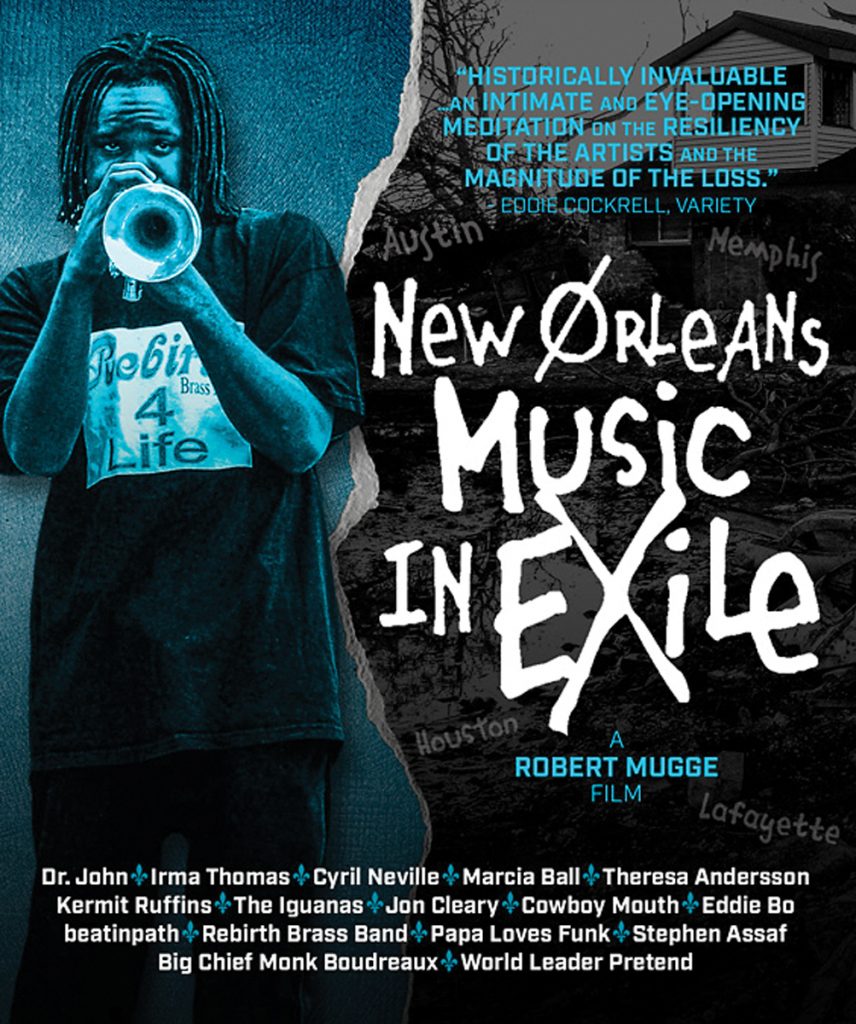Robert Mugge’s 2006 documentary, New Orleans Music in Exile, serves as a time capsule for the shell-shocked months after Hurricane Katrina. Originally broadcast in May 2006 by Starz and Starz In Black, the film has been re-released with many extras in Blu-ray format.
 The new edition of New Orleans Music in Exile follows Katrina’s retrospective-jammed, 10th anniversary year. In 2015, Katrina fatigue set in, so releasing the Blu-ray edition of Mugge’s film in late 2016 was a good idea.
The new edition of New Orleans Music in Exile follows Katrina’s retrospective-jammed, 10th anniversary year. In 2015, Katrina fatigue set in, so releasing the Blu-ray edition of Mugge’s film in late 2016 was a good idea.
Previous documentaries from Chicago native Mugge include The Kingdom of Zydeco, Rhythm ’N’ Bayous and Deep Blues. He knows the roots-music landscape and soundscape.
In 2005, Mugge, his co-producer, Diana Zelman, and crew hit the post-flood ground quickly. They filmed interviews and performances two months after the disaster, while much of New Orleans was still a ghost town. Locations also include the safe-harbor cities of Austin, Memphis, Houston and Lafayette.
The film’s more affecting scenes include the late Eddie Bo entering his ruined Banks Street coffee shop, Check Your Bucket, for the first time.
“We put our heart and soul in here, to have something for musicians and the people from out of town,” Bo says. “And you see what’s left.”
A tragic tourist in his own city, Bo dons protective gear to survey the jumbled mess in the coffee shop. He concludes it won’t reopen. “Let it go,” Bo says.
More often, though, the film captures cautious, if still uncertain, optimism. Interviewees include Dr. John, Irma Thomas, Cyril Neville, Kermit Ruffins, OffBeat publisher Jan Ramsey and Basin Street Records president Mark Samuels.
“Now I’m having more good days than bad days,” Ramsey says in her Frenchmen Street office. “Because I feel like we can survive.”
Even as The New York Times headlines an editorial with “Death of an American City,” Cyril Neville pledges the people of New Orleans will reclaim their city. Later in the film he follows the promise with a condition. The city is a spiritless body, Neville says, “and that’s all it’s going to be without those people from the 6th, 7th, 8th and 9th Wards.”
New Orleans in Exile, revisited 10 years after its cable TV debut, feels like long ago. It remains a revealing document, however, of the city’s darkest times and the early rebuilding process that led to both unsettling change and remarkable rebirth.



